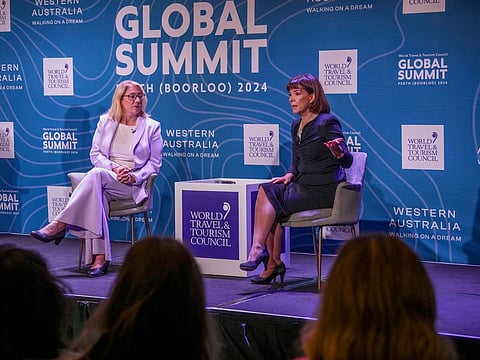‘Airlines have to work around wars’, says WTTC chief as Middle East conflict disrupts aviation
Cancellations, reroutes are only way to ensure passenger safety, says Australian Minister

Perth: Airlines must find a way to adapt to the Middle East conflict, which is disrupting connectivity and the performance of the regional aviation sector, said World Travel and Tourism (WTTC) President and CEO Julia Simpson.
“Obviously, the current issues of human tragedy (in the Middle East) are very worrying. But the reality is that airlines have to work around wars. They have always had to travel around natural disasters and, sadly, wars worldwide,” she said while referring to the unfolding Middle East conflict that is causing operational disruptions to most regional and international carriers.
The WTTC chief addressed the media before the 24th WTTC Global Summit in Perth and said reroutes and flight cancellations are the only way to ensure passenger safety.
Joining Julia was Rita Saffioti, Western Australia’s Deputy Premier, Treasurer and Minister for Transport and Tourism, who said, “It (cancellations/ reroutes) not ideal, but safety (of the passengers) is paramount. A reroute is not ideal, but is essential.”
Australia’s national carrier, Qantas, recently ended the two-week diversion of its London to Perth flight through Singapore, which was implemented to avoid Middle Eastern airspace.
From the UAE, Dubai’s Emirates has cancelled its operations in Beirut, Lebanon, until October 15. After a week-long disruption, flights to Iran (Tehran) and Iraq (Basra and Baghdad) resumed on Tuesday (October 8).
With airspace closed following Iranian missile attacks, airlines have also been forced to take longer, more complicated routes. For example, Qatar Airways' flight QR12 from London to Doha detoured over Athens, the eastern Mediterranean, Egypt, and Saudi Arabia on Monday, adding around 500 miles and an extra hour to the flight time.
Disruptions likely to continue
Flight disruptions, including suspensions and cancellations, are likely to through at least mid-October amid increased tensions between Israel, Iran, and the Lebanese Hezbollah, according to Crisis24.
The European Union's Aviation Safety Agency (EASA) Conflict Zone Information Bulletins (CZIBs) recommend EU air operators not operate in the airspaces of Iran, Israel, and Lebanon at all flight levels. The recommendation is valid until October 31 but can be revised earlier if the situation changes. Moreover, with Russian and Ukrainian skies closed to Western aircraft, the options for flying from Europe to Asia are narrowing daily.
According to Anita Mendiratta, a special adviser to the Secretary General of UN Tourism, the closure of Russian airspace due to the Ukraine conflict had already forced airlines to reroute, increasing travel time, fuel consumption, and ticket prices. Now, with the Middle East conflict, more airspace is being restricted, further driving up fuel costs and affecting routes.

Additionally, problems with manufacturers Boeing and Airbus deliveries exacerbate the situation, impacting global capacity and ticket availability.
She added that tourism-dependent countries like Jordan, Lebanon, and Egypt are suffering due to the inability to operate flights in the region. “The culmination of these factors—geopolitical instability, high fuel prices, aircraft shortages, and restricted airspace—has created a difficult and expensive environment for airlines and travellers,” she said.
Impact on GCC carriers
While the GCC may not face immediate operational issues, the psychological impact will be significant. Contagion effects often discourage people from travelling, even if the region remains safe.
“Fortunately, the GCC has a strong airlift with plenty of medium- and short-haul flights, and the region's people are resilient and accustomed to challenges. However, the region’s growth relies heavily on European, American, and global travellers, and factors like flight availability, travel advisories, and insurance issues could limit travel,” Anita added.
Codeshares, dynamic operations are paramount
This is where codeshare agreements and bilateral deals become crucial, said Anita. “It is vital that airlines don’t lose valuable airport slots, and this is where alliances play a critical role,” she said. Moreover, airlines must be highly dynamic now, with flexible pricing and routing strategies. “It's all about adapting to demand, with airlines making data-driven, unemotional decisions to adjust routes as necessary,” she stated.
Is a GCC- Australia travel corridor in the works?
UAE and other GCC countries are not among Australian tourism's top 10 source markets. However, Rita Saffioti, Western Australia’s Deputy Premier, Treasurer, and Minister for Transport and Tourism, would like to change that. “We're eager to promote tourism across various markets, including the UAE. Western Australia's location, being close to Asia and the wider region, is a significant advantage,” she told Gulf News. “Our proximity to Asia, and even Europe, means shorter flight times than other parts of Australia, and we’re looking to capitalize on that. Rather than seeing our location as a disadvantage, we now view it as a strength in the global travel network,” she added.
Sign up for the Daily Briefing
Get the latest news and updates straight to your inbox



